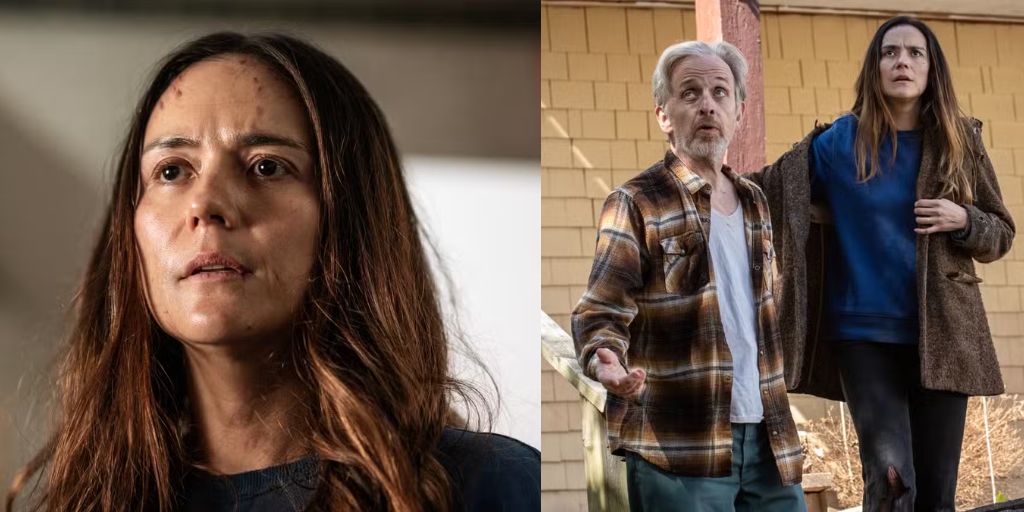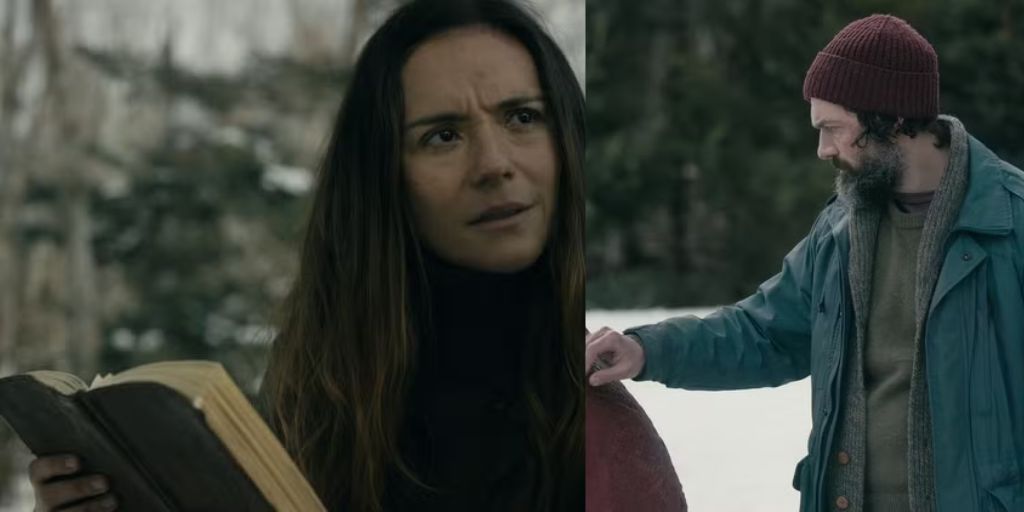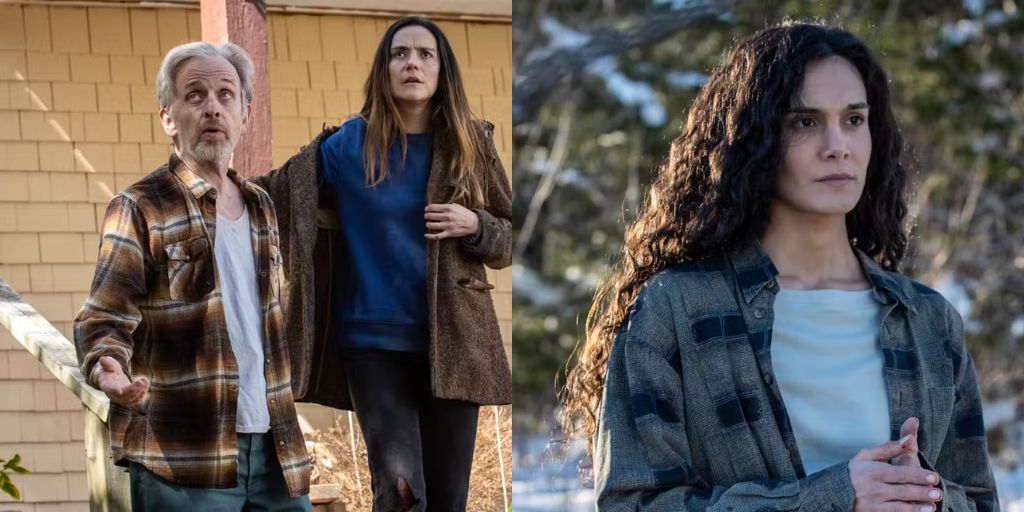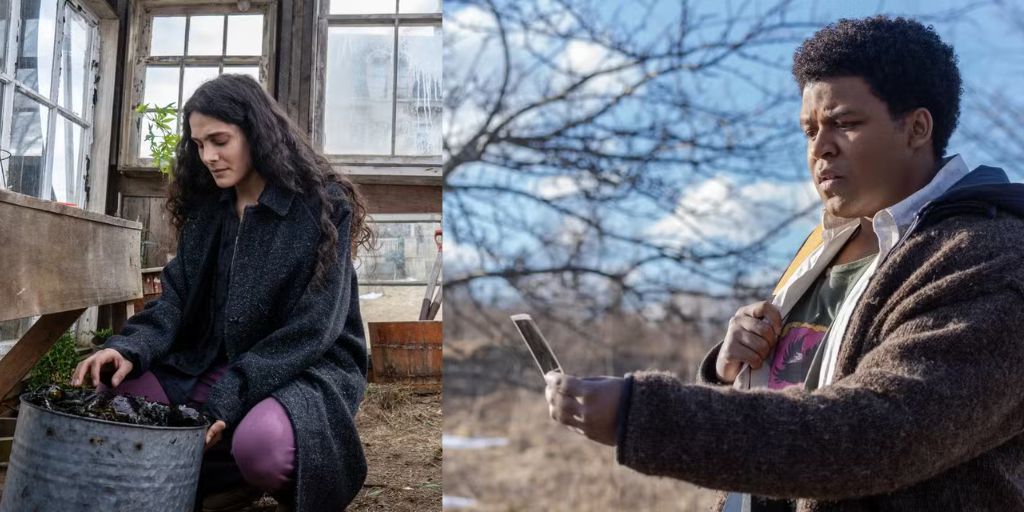The question of what is happening with Fatima’s (Pegah Ghafoori) pregnancy has lingered in the minds of viewers since the start of Season 3 of “From.”
This mystery has become more intense as the episodes unfold. In Episode 6, a surprising twist complicates the situation dramatically.
The beginning of Episode 7, titled “These Fragile Lives,” picks up right where we left off, with the shocked faces of Fatima, Ellis (Corteon Moore), and Boyd (Harold Perrineau) as they learn the startling news that Fatima is not pregnant.
At least, not in the conventional sense. The ultrasound shows no baby, and Fatima’s unsettling cravings only add to the mystery. This leads to two terrifying possibilities.
As confusion erupts in the hospital room, Fatima and Ellis return to Colony House filled with despair. Boyd feels a strong responsibility to figure out what is happening. He turns to Kristi (Chloe van Landschoot) and insists that she must find a solution to this strange problem.
However, they are all still uncertain about the true nature of the issue. Later, Boyd speaks with Donna (Elizabeth Saunders) about Fatima’s condition, emphasizing the need for transparency as they lead their community. Boyd shares his fears about Fatima’s situation.
He worries that she could be genuinely pregnant, but with something that does not appear on the ultrasound.
This could be a manifestation of the terrifying, supernatural elements of their environment—much like when a bus crawled under Boyd’s skin in Season 2, an image that only he could see.
The second, more psychological possibility is that Fatima’s mind is being influenced by their surroundings. The dreadful atmosphere may be starting to penetrate her thoughts, just as it did with Boyd’s wife and Sarah (Avery Konrad).
This psychological horror adds a layer of complexity to the narrative, making the audience question what is real and what is a product of the characters’ fears.

Each of these possibilities implies that doom and death are imminent. Because of this, Donna insists that they need to move out of Colony House to safeguard the other residents.
Boyd understands her concern but is left feeling frustrated. The delicate balance between leadership responsibilities and personal emotions is tested as they deal with this chaotic situation.
Meanwhile, the final scenes of Episode 6 show Tabitha (Catalina Sandino Moreno) recalling a haunting dream from her childhood. In this dream, she runs from an unknown entity at the homestead, a location filled with creepy mannequins and ominous red rocks.
This episode also features Tabitha, Ethan (Simon Webster), and Jade (David Alpay) as they decide to return to the homestead in search of answers. As Jim (Eion Bailey) is gathering crops with other residents, he sees Tabitha and becomes worried.
He tries to dissuade her from pursuing her investigation. Jim is deeply concerned about how she is linked to this dreadful place, fearing that going into its mysteries could lead to horrific consequences. This concern adds depth to Jim’s character, showcasing his protective instincts toward those he cares about.
However, Jim eventually relents, allowing Tabitha to follow her instincts. This leads to a disturbing conversation with Jade. Jim shares his theory that Tabitha’s dreams about this strange place as a child may have sealed her fate.
He believes she was always destined to encounter that tree, implying that fate has played a cruel hand in her life.
This discussion highlights the show’s ongoing theme of destiny and the inescapable nature of the characters’ circumstances. The past and present are intertwined, affecting their decisions and ultimately their fates.
A new character, Acosta (Samantha Brown), enters the scene with an eager desire to find answers. She shows signs of what some may call “I’m going to solve this” syndrome, and Kenny (Ricky He) quickly notices this when he talks to her in the diner.
Acosta feels slighted by Boyd’s authority and his rejection of her ideas. During her conversation with Kenny, she expresses her frustration.
When he tries to discuss the situation with her, she retaliates against his acceptance of the current events, further voicing her dissatisfaction. Acosta storms out of the diner with a renewed determination to escape the town.
Just as she leaves, Bakta (Angela Moore) enters and suggests reopening the diner. This moment captures the tension within the group as they each pursue their own goals, reflecting the fragmented dynamics among the residents.
Later, Acosta confronts Boyd again, this time demanding her gun back. After a heated argument, Boyd reluctantly agrees to return the weapon but chooses to keep the bullets. He tells her that he will give them back once she has proven herself deserving of them.
This interaction shows Boyd’s growing approach to leadership. He is learning to overcome the pressures that come with leading a community under duress, while also trying to maintain personal relationships with the other residents.
In another storyline, Jullie (Hannah Cheramy) is nurturing her budding connection with Randall (A.J. Simmons) by accompanying him on a walk.
During their time together, she reveals that she does not have her driver’s license yet. This disclosure inspires Randall to teach her how to drive using the town’s emergency vehicle.

This leads to a light-hearted joyride, offering a brief moment of relief amidst the ongoing tension in the show.
However, their carefree moment is interrupted when Randall is once again attacked by his hallucinations of locusts. In a panic, he jumps out of the car, with Jullie closely following him.
As they run through the forest, they stumble upon the ruins that were shown in Season 2. This is the same place where Boyd found Julie, Randall, and Marielle (Kaelen Ohm) when they were trapped in a comatose state caused by the cursed music box.
Julie feels an eerie connection to the ruins and expresses a desire to find them further, but Randall urges her to reconsider.
Their choice to walk away from the potential danger showcases one of the more rational decisions in horror history, emphasizing the theme of survival that permeates the series. They are faced with the decision to confront their fears or avoid the unknown horrors that lie ahead.
In Season 3, Episode 7, trouble arises in the relationship between Victor (Scott McCord) and his father, Henry (Robert Joy).
After Victor retrieves the ventriloquist dummy, Jasper, he becomes frustrated with Henry’s silence. Henry grows uncertain about Victor’s obsession with the puppet and tries to distance him from it, causing tension between father and son.
Victor decides to take Jasper to Sarah’s house, using her basement as a space for Jasper to potentially reveal his secrets. This subplot adds emotional depth to the characters, finding the dynamics of their relationships amid the chaos around them.
Meanwhile, Henry finds himself sharing a drink with Donna at the bar. During their conversation, he opens up about his internal struggles. For a brief moment, he expresses regret about coming to the town with Tabitha.
He contemplates whether it would have been easier if he still believed Victor was dead, indicating the emotional burden he carries. This moment sheds light on the psychological toll that their experiences have had on him, as he grapples with feelings of loss and guilt.
Back at Colony House, Elgin (Nathan D. Simmons) provides a poignant moment in Episode 7. He creates a handmade crib mobile for Fatima’s unborn child, showcasing his nurturing side. However, the delicacy of this scene is soon disrupted by a memory of the camera he acquired in a previous episode.
The camera prints out a polaroid depicting the doors of the bunker that viewers saw in Seasons 1 and 2. This revelation compels Elgin to investigate further. He discovers doors within the bunker that lead to a boarded wall.
Just as he is about to give up, he hears ominous knocking from behind the wall. As he moves a piece of furniture, he uncovers another door that opens into a small room, revealing a decaying skeletal corpse in the corner.
In this chilling moment, Elgin turns to the illusory kimono lady who had promised to save them, and he questions, “Is this really what happens?” This inquiry encapsulates the essence of the series, where characters are continually forced to confront their fears and uncertainties.
Elgin’s discovery adds yet another layer of mystery to the narrative, leaving viewers to ponder the implications of this newfound information and what it means for the characters.
Returning to the central mystery surrounding Fatima in this episode, she finds herself on the brink of losing her grip on reality.
She wrestles with the implications of the ultrasound and pleads with Ellis to believe that something is genuinely inside her. She struggles to cope with the thought that all the chaos and horror surrounding them may stem from her.
At the same time, Ellis and Boyd are left questioning what they should be preparing for or fearing. They ponder whether Fatima is experiencing a psychological breakdown or if there is a supernatural entity growing within her.
This uncertainty heightens the tension, as the characters grapple with their own fears and anxieties while trying to understand the nature of their reality.
Marielle hooks Fatima up to an IV drip to provide her with nourishment. However, in a disturbing twist, Fatima’s body rejects the nutrients and instead craves things that are far from alive.
The situation takes a horrifying turn when Fatima sees her stomach cave in and begins to writhe in agony on the bed, releasing excruciating wails of pain.
When Ellis enters to comfort her, he becomes increasingly alarmed by her condition. In a desperate attempt to help, he seeks anti-psychotic medication from the hospital, but Kristi intervenes, claiming that it could worsen Fatima’s state. Boyd, recognizing the emotional turmoil Ellis is experiencing, steps in to mediate.

Despite the chaos, Ellis remains calm but distressed as he slowly returns to Fatima. He has already confided in Tillie (Deborah Grover) about Fatima’s uncertain status regarding her pregnancy.
Tillie, an older woman with cancer, expresses her desire to help, motivated by her appreciation for a good love story.
She seeks to support Fatima in her time of need, showcasing her compassionate nature. When Tillie finds Fatima in the greenhouse, she approaches her in an attempt to provide comfort. However, Fatima, overwhelmed by her sensations and confusion, lashes out in fear and desperation.
In a shocking turn of events, Fatima grabs a pair of shears and violently stabs Tillie in the chest. This act of aggression leaves Ellis to walk into a horrific scene where Fatima is crying over Tillie’s lifeless body. Tillie, even in her final moments, urges them to run away from the situation.
This violent act encapsulates the show’s themes of fear, desperation, and the consequences of unchecked supernatural forces.
The emotional impact of this moment leaves viewers in shock, solidifying the idea that the characters’ struggles are not only against external horrors but also their own inner demons.
The complexities of the relationships and the psychological battles they face add depth to the narrative, creating a gripping atmosphere of suspense.
As the story unfolds, the audience is left pondering the fates of Fatima, Ellis, and the rest of the Colony House residents. Each character faces their own challenges, grappling with personal fears and the dark forces that threaten their existence.
Throughout the series, the writers expertly weave together elements of horror, psychological drama, and mystery. The twists and turns keep viewers engaged, as each revelation adds another layer to the story. The characters’ interactions highlight their resilience in the face of overwhelming odds, making them relatable and compelling.
The question of what is truly happening with Fatima’s pregnancy remains unanswered, adding to the tension of the show.
Viewers are left anxiously awaiting further developments as the characters overcome the challenges posed by their environment. The supernatural elements continue to intrude upon their lives, forcing them to confront their worst fears and ultimately question their own realities.
As Season 3 progresses, the stakes continue to rise. The characters are pushed to their limits, both emotionally and physically, as they strive to survive in a world filled with unknown dangers.
The emotional connections between them deepen, and their struggles resonate with audiences, making them invested in the outcome.
Each episode builds upon the last, creating a rich collection of storytelling that impresses viewers. The blending of horror and psychological elements allows for a unique viewing experience, drawing audiences into a world where nothing is as it seems.
As the mysteries unfold, the characters’ journeys become increasingly intertwined, leading to a crescendo of suspense and emotional turmoil.
“From” Season 3 presents a gripping narrative filled with shocking twists and emotional depth. The story covers the complexities of relationships and the impact of supernatural forces on the characters’ lives.
As the series continues, audiences are left eagerly anticipating what lies ahead for Fatima, Ellis, and their companions in the Colony House.
The questions raised by their experiences challenge viewers to consider the nature of fear, destiny, and the lengths one will go to protect those they love.
As “From” Season 3 unfolds, the intertwining narratives of the characters deepen the mystery surrounding Fatima’s unsettling condition, presenting viewers with a haunting tale of fear, identity, and the unknown.
The series masterfully blends psychological horror with supernatural elements, compelling the audience to confront the thin line between reality and the psyche.

One of the pros of this episode is its ability to create intense emotional moments, particularly during Fatima’s shocking actions, which highlight the characters’ vulnerabilities. Additionally, the suspenseful pacing keeps viewers engaged, eager to uncover the next twist in the plot. However, a con is that some viewers may find the plot increasingly complex, leading to confusion about the overarching narrative.
Fatima’s plight, marked by her agonizing cravings and the terrifying implications of her supposed pregnancy, serves as a potent metaphor for the broader struggles faced by all the residents of Colony House.
As they grapple with their inner demons and the external horrors of their environment, viewers are left on the edge of their seats, eagerly anticipating how these intricate threads will converge.
With each episode, the stakes rise, revealing the fragile nature of hope and the enduring power of human connection in the face of overwhelming darkness.
As the season progresses, fans can only wonder what fate awaits Fatima and her companions as they overcome this treacherous terrain, leaving us hungry for answers and immersed in the chilling atmosphere that defines “From.”




